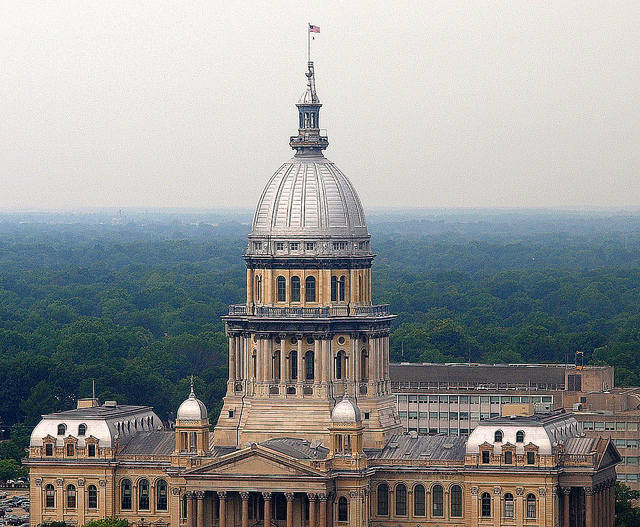#MeToo Reaches Illinois Capitol As Open Letter Details Misogyny In Springfield
By Emma G. Gallegos in News on Oct 24, 2017 3:33PM
The allegations of sexual abuse that started with producer Harvey Weinstein have been felt far outside of Hollywood. Women all around the world have been sharing their stories with a #MeToo hashtag, and now women in Illinois politics are signing on to say sexual abuse is rampant in their line of work, too.
"Misogyny is alive and well in this industry," declares an open letter. The letter goes on to describe all the different ways that women are harassed and abused in their industry: everything from lewd comments to groping to insinuations that the only way to get ahead is to sleep your way to the top. The letter says that this is not just bad for the women who work in the state government, but it's bad for the people they represent: "So women choose to leave careers in public service, and all Illinoisans suffer the loss of their brilliance and commitment to creating a better Illinois."
Here are some of the allegations from the open letter:
It looks like The Globe on any given session night in Springfield, where it's clear that a woman must endure the crude jokes and untoward advances of male colleagues and legislators if she wants to garner support for her work.It looks like a male legislator—a chamber leader—asking a female staffer out to dinner under the guise of offering mentorship, then proceeding to explain his "open marriage" to her and ask if she's single.
It looks like a female staffer leading a complex bill negotiation, and the male legislator whose assent is crucial to her success starts texting her late at night asking what she's doing. (The answer? She was sleeping. Because she was working with dogged pursuit to accomplish her goals.)
It looks like a committee chairman, with the power to kill her bill, telling a female staffer "nice ass" as she walks through the hotel hallways fresh from her morning workout, the forced intimacy of staying in the same hotels leaving little room for privacy or refuge.
It looks like the candidate who slides his hands across the body of his fundraising consultant during call time. Who calls and texts her in the middle of the night, and refuses to pay her what she is owed because his advances are rebuked.
It looks like the popular downstate (married) county chairman, who while walking down Michigan Avenue late one evening after attending a campaign fundraiser with a much younger female campaign staffer, asks if she'd like to come upstairs to his hotel room for a "night cap."
It looks like the female colleagues who advise the next generation of women to "flirt back" and to "smile and shrug it off" because "that's what I had to do to get ahead."
An administrator told the Chicago Tribune that 129 women had signed the document.
"A lot of us felt like it was just us — we were being singled out because we were young or we were alone or we were single," Katelynd Duncan, founder of political fundraising organization KJD Strategies told the Tribune. "This demonstrates solidarity that there's not a woman in this industry we know who hasn't had this experience. It's a testament to how long we've been experiencing this in the shadows and behind closed doors and keeping it to ourselves."
Illinois isn't the first state government to make these sorts of allegations. Women in California politics and other states have come forward to share their own #MeToo stories.
Some Illinois lawmakers are already responding. State Rep. Sarah Feigenholtz, who signed the letter, told the Tribune she wants to file a resolution that forces lawmakers to address the culture.
State Senators Litesa Wallace and Daniel Biss said that they are introducing legislation, requiring all legislators, their staff and lobbyists to undergo sexual harassment training, according to Capitol Fax.
"Widespread sexual harassment is one of many reasons women, especially women of color, are underrepresented in Springfield," said Wallace, in a statement. "We have the power to change this culture, and to set up our systems to support women—and with that power comes a responsibility to act. That's why raising awareness isn't enough. We owe it to all the women who have shared their experiences, and to all those who haven't come forward, to build systems set up to prevent sexual harassment."
